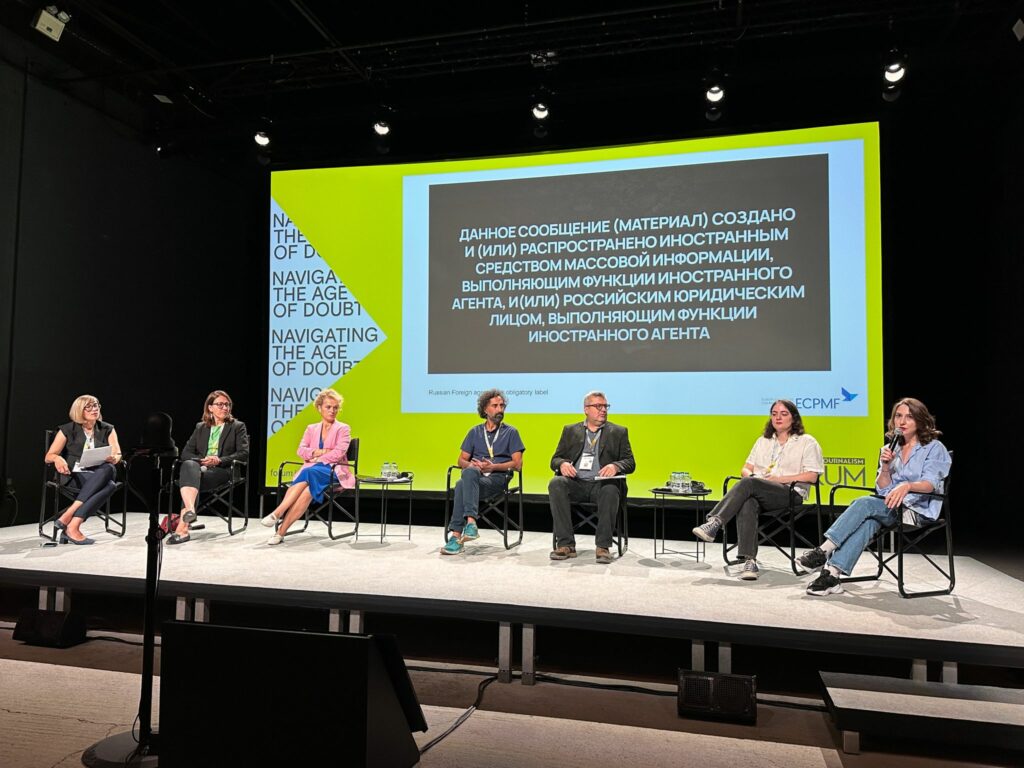The https://english.atlatszo.hu use cookies to track and profile customers such as action tags and pixel tracking on our website to assist our marketing. On our website we use technical, analytical, marketing and preference cookies. These are necessary for our site to work properly and to give us inforamation about how our site is used. See Cookies Policy
“Foreign agent” bill disguised as a transparency measure in Hungary: postponed but not forgotten
Across Europe, “foreign agent” laws are increasingly used to limit media freedom. Often framed as transparency measures , they stigmatize outlets receiving foreign funding, branding them as untrustworthy or hostile. These measures follow the blueprint set by Russia’s 2012 „foreign agent” law, which targeted NGOs before expanding to media outlets and journalists. This was the topic of the panel discussion organized by the European Centre for Press and Media Freedom (ECPMF) at the iMEdD International Journalism Forum 2025 in Athens, Greece, where I delivered this speech.
For more than a decade, Átlátszó, the nonprofit investigative outlet which I co-founded, has uncovered how public money and EU funds have been diverted into private pockets in Hungary. Instead of responding with accountability, the Hungarian government has waged a systematic propaganda war against this newsroom, mainly using the foreign agent rethoric based solely on the fact that the publisher receives foreign grant money in addition to reader donations.

The demonization of organizations receiving foreign grants began more than a decade ago in Hungary, when authorities raided the office of a grant-making organization for political reasons. Grantees became a target themselves, with government politicians and the government press repeatedly accusing us of representing foreign interests and even attacking Hungary in connection with our reporting.
Since then, these attacks have become regular and repetitive, and the choreography has always been similar: the government press cries out about foreign agencies and treason, then the government’s favorite pseudo-civil society organization holds a press conference and urges the government and the secret services to intervene.
Until recently, however, all this remained a smearing operation to intimidate independent media, with no official investigations or state sanctions following the propaganda campaigns. Last year, however, the Hungarian government established a state authority called the Sovereignty Protection Office, which has now lent the authority of the state to these absurd accusations. This new authority immediately targeted Átlátszó, launched an official investigation against us, and published a report riddled with lies and absurdities about us.
According to this official report, Átlátszó is member of a network created by foreign secret services, a member of a kind of deep state that serves foreign interests at the expense of Hungarian interests, and conducts intelligence-gathering and disinformation activities disguised as journalism, which are extremely harmful to Hungary’s sovereignty. In order to discredit our organization, this report was widely circulated in the government press, and a video was even made of it, which was distributed to hundreds of thousands of people through social media in the form of paid advertisements.
The official report and the smear campaign had an intimidating effect on our editorial staff, but no official sanctions followed at that time. We have filed a lawsuit against the Sovereignty Protection Office for defamation due to the false report, which is currently ongoing. We would like to see evidence for the serious accusations made against us, but their legal argument has so far been limited to stating that the agency is entitled to express its opinion and is not required to substantiate its claims with evidence.
Nevertheless, at the beginning of this year, the ruling party introduced a bill in Parliament that would allow organizations deemed harmful by the Sovereignty Protection Office to be blacklisted, and once blacklisted, these organizations would not be able to receive foreign funding, including EU grants, or even domestic tax donations. In the case of Átlátszó, this would result in a total revenue reduction of around 70%, and we would effectively go bankrupt in a short period of time if the law were passed in its current form.
The same applies to other independent media outlets and critical civil society organizations that follow a similar business model in Hungary. If this Russian-style foreign agent bill is passed, only state-funded, party-propaganda media would remain in Hungary. The Hungarian Parliament did not pass this bill in the first half of the year, but the Prime Minister promised that it would definitely be passed by the end of this year.
The campaign against Átlátszó shows us how twenty-first-century authoritarianism works. It does not always silence journalism with an explicit ban. It surrounds independent voices with suspicion, delegitimization, and intimidation, attempts to make their reporting look suspicious and unpatriotic, and uses all means possible to make their operation financially impossible.
Átlátszó has been repeatedly portrayed as a tool of George Soros, of Brussels, or of shadowy “foreign powers”. For example, after Átlátszó revealed how companies linked to the prime minister’s son-in-law benefited from EU-funded street-lighting contracts, pro-government media dismissed the reporting as “Soros propaganda.” The substance of the corruption case was ignored; the focus was instead on branding the outlet as foreign-controlled.
When Átlátszó published investigations into luxury vehicles – including private jets and luxury yachts – owned by ruling-party elites, state-aligned outlets accused its journalists of “defaming Hungary abroad.” Instead of debating whether politicians had enriched themselves, the narrative became: independent journalists are harming the nation. The corruption evidence was never addressed.
And yet, despite all the pressure, Átlátszó persists. It still investigates then enrichment of oligarchs, environmental pollution, suspicious public procurement deals, and the luxurious lifestyles of those who claim to serve the people. It does so because it believes Hungarians have the right to know. But make no mistake: solidarity is essential. Independent outlets survive only if citizens and international allies continue to support them.
Written by Tamás Bodoky. Cover image: / Linkedin
Share:
Your support matters. Your donation helps us to uncover the truth.
- PayPal
- Bank transfer
- Patreon
- Benevity
Support our work with a PayPal donation to the Átlátszónet Foundation! Thank you.
Support our work by bank transfer to the account of the Átlátszónet Foundation. Please add in the comments: “Donation”
Beneficiary: Átlátszónet Alapítvány, bank name and address: Raiffeisen Bank, H-1054 Budapest, Akadémia utca 6.
EUR: IBAN HU36 1201 1265 0142 5189 0040 0002
USD: IBAN HU36 1201 1265 0142 5189 0050 0009
HUF: IBAN HU78 1201 1265 0142 5189 0030 0005
SWIFT: UBRTHUHB
Be a follower on Patreon
Support us on Benevity!

